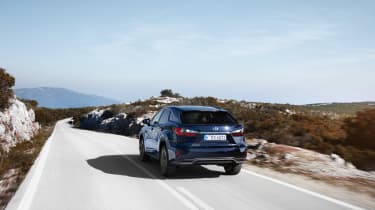Lexus RX review - luxury SUV now a better all-rounder, but no drivers' car
New luxury SUV will undoubtedly be great to own - shame it isn't better to drive, too
What is it?
The fourth generation of one of Lexus' biggest-selling vehicles - since its launch, the RX line of SUVs has accounted for three in ten Lexus sales, or around 2.2 million vehicles in total.
The latest generation is a little larger than before and Lexus claims to have stepped up driving appeal and visual flair - though as with other recent Lexus models, the latter is very much open to personal interpretation.
Performance and 0-60 time
Just two engines will be available in the UK. The RX 200t uses a 2-litre, four cylinder turbocharged unit and can be found in several recent Lexus models, including the IS and smaller NX crossover. It develops 235bhp at 4800-5600rpm and 258lb ft of torque from 1650rpm. It's also attached to a torque converter automatic transmission, and comes in front- and all-wheel drive forms.
Performance is blunted somewhat by the RX's weight (1885kg is a lot for a 2-litre unit to haul around), and its 0-60 time of 9.2sec (in front-drive form) and top speed of 124mph lag behind diesel-powered rivals. As usual, Lexus does not offer its own diesel variant.
The other powertrain can be found in the RX 450h. The hybrid model is expected to be the bigger seller, largely thanks to CO2 emissions of only 120g/km - significantly lower than the diesel class norm. It's also the stronger engine - a 3.5-litre V6 cosies up with an electric motor, while the back wheels are fed by another electric motor. Total system output is 308bhp.
More reviews
Reviews
Deploying the full output to the road results in a 0-62mph time of 7.7sec, maxing out at 124mph. Drive here is by 'e-CVT' - Toyota- and Lexus-speak for the planetary gearset used to seamlessly mix petrol and electric power.
Technical highlights
To meet the firm's handling and ride goals, the RX is available with electronically controlled Adaptive Variable Suspension, and optional active anti-roll bars. Unfortunately, Lexus UK has chosen not to offer the latter on UK cars.
As has become the norm, comfort and sport modes allow drivers to tailor the damping behaviour to suit different driving styles, along with equivalent changes to steering effort, transmission and throttle response, and in the case of Eco mode, different air conditioning settings.
What's it like to drive?
The RX is best at gentler speeds, regardless of the powertrain underneath you.
If offered the choice though, we'd opt for the hybrid in F-Sport trim. Not only is it the faster of the duo, the V6 simply suits the character of the car. While hardly tuneful, it's a great deal smoother than the thrashy four-pot, which feels strained under hard acceleration. The RX 200t's gearbox doesn't help, letting the engine wheeze its way to the limiter in automatic mode. It's better selecting gears manually, allowing you to ride the mid-range torque instead.
The hybrid's e-CVT isn't as droning as you might expect, but the rise and fall of revs independent of road speed still removes a layer of interaction and response missing from the regular autos and dual-clutches of rivals. It's better at a cruise, when engine revs remain low and the V6 becomes almost inaudible.
Handling is best described as ‘safe’. There's not much steering feel but the rate of response and weighting are both consistent, so you can place the car accurately – until tyre squeal sets in, quickly followed by persistent understeer.
The 200t feels a little lighter in the nose but the 350h rides with a little more pliancy. It weighs upwards of 2100kg though, which really manifests itself in quick direction changes, where the electronic damping struggles to keep up and the car bobs around, even in the firmer Sport mode.
Lexus should be commended for refining brake pedal feel on its hybrid model though – it’s getting very difficult to discern the difference between electrical regeneration and friction braking. Both are comfortable cars too, and the solidly-built cabin, cosseting seats and quality touch points all boost the ownership (if not the driving) experience.
Rivals
With the hybrid set to be the big seller, Lexus sees cars like the Mercedes GLE, BMW X5, Volvo XC90, Range Rover Sport and Audi Q7 – all in diesel form – as the car’s closest rivals.
Where it edges them out is in the MPG and CO2 arms race, with emissions as low as 120g/km and combined economy from 54.3mpg. Hitting that in the real world could prove difficult, though the same can be said for the diesels. Company users will also see significant benefits, thanks to low BIK rates. Given the current whirlwind of negative news around diesel, customers may also be better predisposed to hybrids right now.
What the Lexus can’t do is match the others dynamically. The X5 is still impressively taut on the road while Volvo’s XC90 is supremely comfortable – and has an air of understated styling elegance that can’t be levelled at the RX’s origami metalwork.
Price
RX models begin at £39,995 for an RX 200t in S trim. You’ll pay another £6000 for Luxury trim and £2000 on top of that for F Sport.
Hybrid models start with an SE grade at £46,995. Luxury is £3000 more, F Sport another £3000 and the range-topping Premier comes in at £57,995. While Lexus concedes that some models are more expensive than those of rivals, the RX is better-equipped – and like-for-like, the Japanese car typically emerges as the best value.






